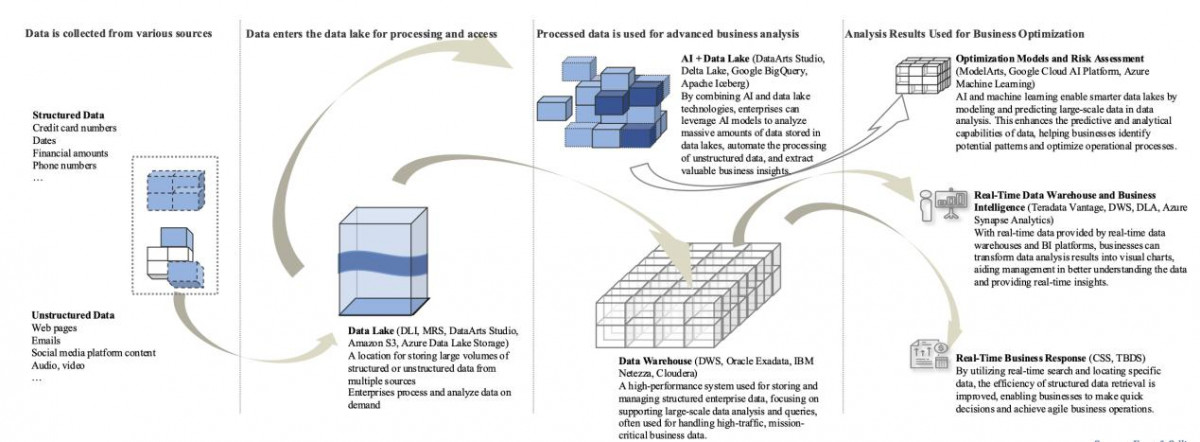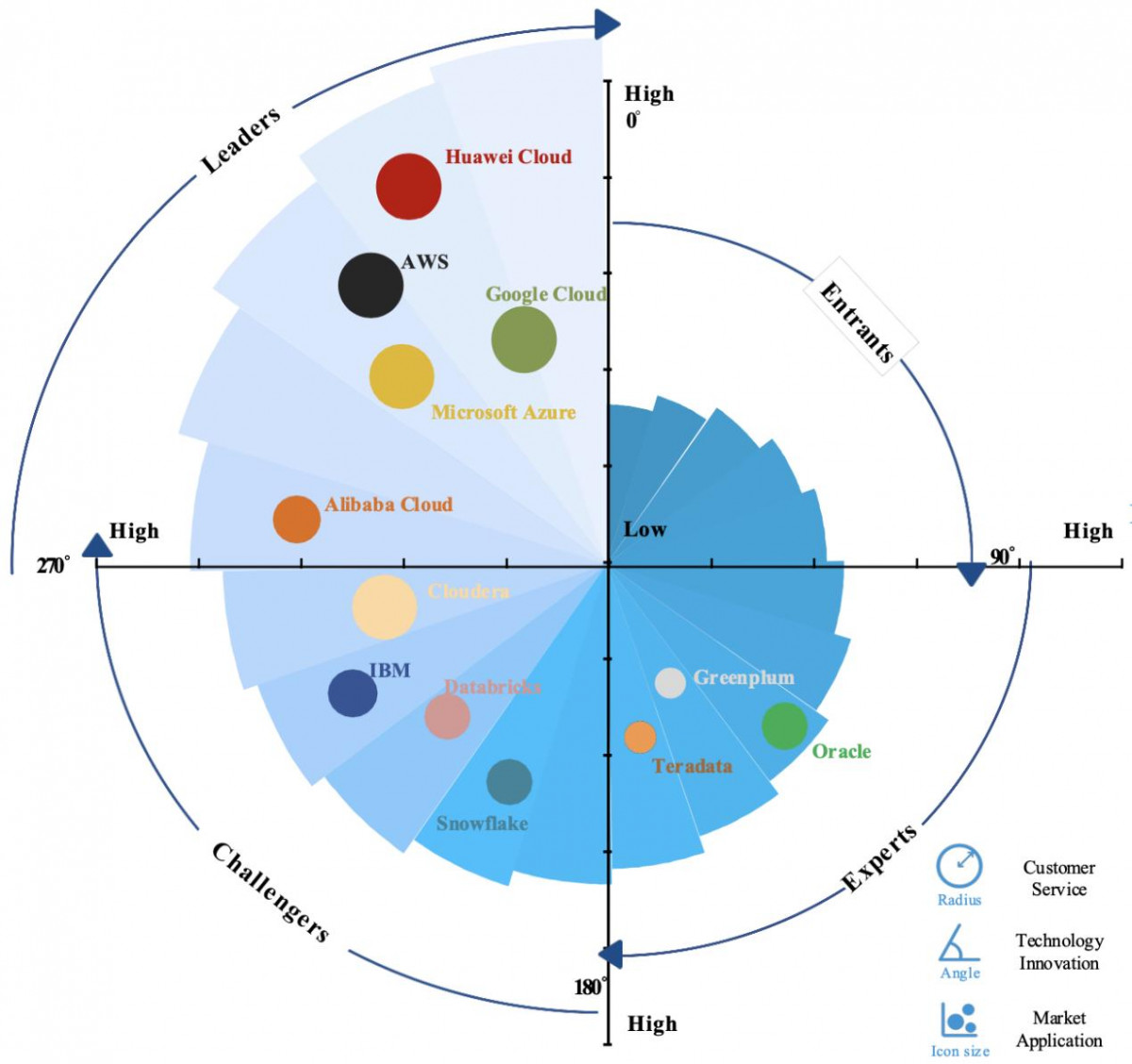How the Emerging Asia-Pacific Region is Transforming Industries Through the Power of Big Data


In Brief
Big data integration in Asia-Pacific sectors is transforming finance, government, and telecommunications, enhancing operational efficiency, personalized experiences, and robust risk management, demonstrating its significant technological and economic influence.

Integrating big data solutions across sectors is driving a wave of transformation in the developing Asia-Pacific region. With a focus on sectors such as finance, government, and telecommunications, big data platforms enable operational efficiency, personalized experiences, and robust risk management. These changes demonstrate how big data is influencing the technological and economic environment in the area.
The Big Data Ecosystem: A Brief Overview
A whole ecosystem that includes data collecting, storage, computing, analysis, and application is referred to as the big data market in the developing Asia-Pacific area. Businesses may use this ecosystem to access large datasets and provide insights that can be put to use. Data lakes, data warehouses, and intelligent data lakes are examples of core technologies that have become essential parts of this ecosystem.
As sectors like banking and telecoms transition to digital models, this ecosystem flourishes. The need for big data platforms has increased due to the quick growth of digital communications and online commerce. Businesses use these platforms to combine software and hardware solutions, guaranteeing smooth analysis and insight creation that eventually improves decision-making skills.
Driving Digital Transformation Adoption of Big Data
Big data solutions are in high demand as a result of the expanding Asia-Pacific region’s trend toward the digital economy. Big data analytics is being used by businesses and governments more and more to solve pressing issues and enhance services. Big data is used by financial organizations to fight fraud, streamline risk management procedures, and offer individualized client experiences. For example, to forecast market trends and improve their services, banks in Singapore and Malaysia have used sophisticated analytics.

Another industry that is greatly benefiting from the use of big data is telecommunications. In order to customize services and improve networks, Indonesian operators examine consumer use trends. Similar to this, government programs in nations like Malaysia and Thailand are concentrating on smart city efforts, leveraging big data to improve public safety, urban planning, and traffic management.
Big data has enormous potential, but it also has drawbacks. Complex solutions are needed for problems, including fragmented data, delays in real-time analysis, and security risks. Investments in technology that successfully handle these issues have increased in response to the need for real-time data processing, guaranteeing more efficient operations and increased productivity.
The Development of Intelligent Data and Real-Time Data Processing
One of the most important technologies for keeping companies flexible and responsive is real-time data processing. Industries such as retail, manufacturing, and finance are harnessing these capabilities to improve consumer experiences, manage risks, and enhance decision-making processes. Accurate and effective analytics are made possible by the dynamic scaling of data operations made possible by the combination of intelligent data lakes with real-time computing.
Intelligent data lakes also play an important role in decreasing operational difficulties. These solutions optimize resource management, especially for sectors that handle massive datasets, by offering powerful analytics and elastic scaling. Moreover, the combination of edge computing with intelligent data lakes has further enhanced data processing capabilities, allowing faster insights and improved resource utilization in industries like logistics and IoT-driven smart cities.
Standards for Assessing Big Data Service Suppliers
Big data suppliers are evaluated according to how well they perform in three crucial areas: customer service, technological innovation, and market applicability. These standards guarantee that businesses get solutions that meet both their operational and legal demands.
Market application evaluates suppliers’ capacity to satisfy demands unique to a certain industry. Companies like Huawei Cloud and AWS thrive in catering to varied industries such as banking and telecommunications across numerous locations, giving solutions adapted to local requirements.
Providers’ proficiency in fields like intelligent data lakes, elastic scalability, and AI integration is the main focus of technological progress. Because these characteristics improve the accuracy of analytics and aid in crucial decision-making, vendors showcasing superior real-time processing and fault tolerance skills are especially appreciated.
The localization and modification of solutions are assessed by customer service. Higher scores are given to providers who offer strong security, compliance, and risk management services. This emphasis guarantees that companies can easily implement big data technology while upholding data integrity and adhering to local laws.
Huawei Cloud and Other Big Data Industry Leaders
In the developing Asia-Pacific area, Huawei Cloud, AWS, Microsoft Azure, Google Cloud, and Alibaba Cloud are considered leaders in the big data industry. These suppliers are spearheading innovation and providing cutting-edge solutions that meet businesses’ changing demands.

In particular, Huawei Cloud has made inroads into regions like Bangladesh, Thailand, and Hong Kong. Organizations have been able to improve decision-making and optimize operations thanks to its proficiency in intelligent data lakes and real-time analytics. The emphasis on regulatory compliance and data security further confirms its position as a preferred partner for corporations.
AWS is a market leader in places like Singapore, where its vast support services and cloud ecosystem enable companies to grow and develop successfully. In the same way, Microsoft Azure helps businesses in Malaysia and Thailand with their digital transformations by providing AI-driven analytics.
Other suppliers, including IBM, Cloudera, and Databricks, are considered market competitors. To satisfy consumer needs, these businesses concentrate on growing their footprint and improving their technical prowess. Experts such as Teradata and Oracle are renowned for their enterprise-level proficiency in providing tailored solutions that meet particular needs.
Big Data’s Future in Developing Asia-Pacific
The market for big data in the developing Asia-Pacific area is expected to increase steadily. The need for sophisticated data solutions will only grow as enterprises continue their digital transformation processes. It is anticipated that providers like Microsoft Azure, AWS, and Huawei Cloud will drive this growth, advancing technology and adding value for businesses.
Businesses may improve operational efficiency and satisfy the needs of dynamic markets by utilizing AI integration, intelligent data lakes, and real-time analytics. Big data technology will become more and more important in determining the direction of sectors as they develop, helping businesses stay flexible and competitive in the digital market.
Disclaimer
In line with the Trust Project guidelines, please note that the information provided on this page is not intended to be and should not be interpreted as legal, tax, investment, financial, or any other form of advice. It is important to only invest what you can afford to lose and to seek independent financial advice if you have any doubts. For further information, we suggest referring to the terms and conditions as well as the help and support pages provided by the issuer or advertiser. MetaversePost is committed to accurate, unbiased reporting, but market conditions are subject to change without notice.
About The Author
Victoria is a writer on a variety of technology topics including Web3.0, AI and cryptocurrencies. Her extensive experience allows her to write insightful articles for the wider audience.
More articles

Victoria is a writer on a variety of technology topics including Web3.0, AI and cryptocurrencies. Her extensive experience allows her to write insightful articles for the wider audience.


















































